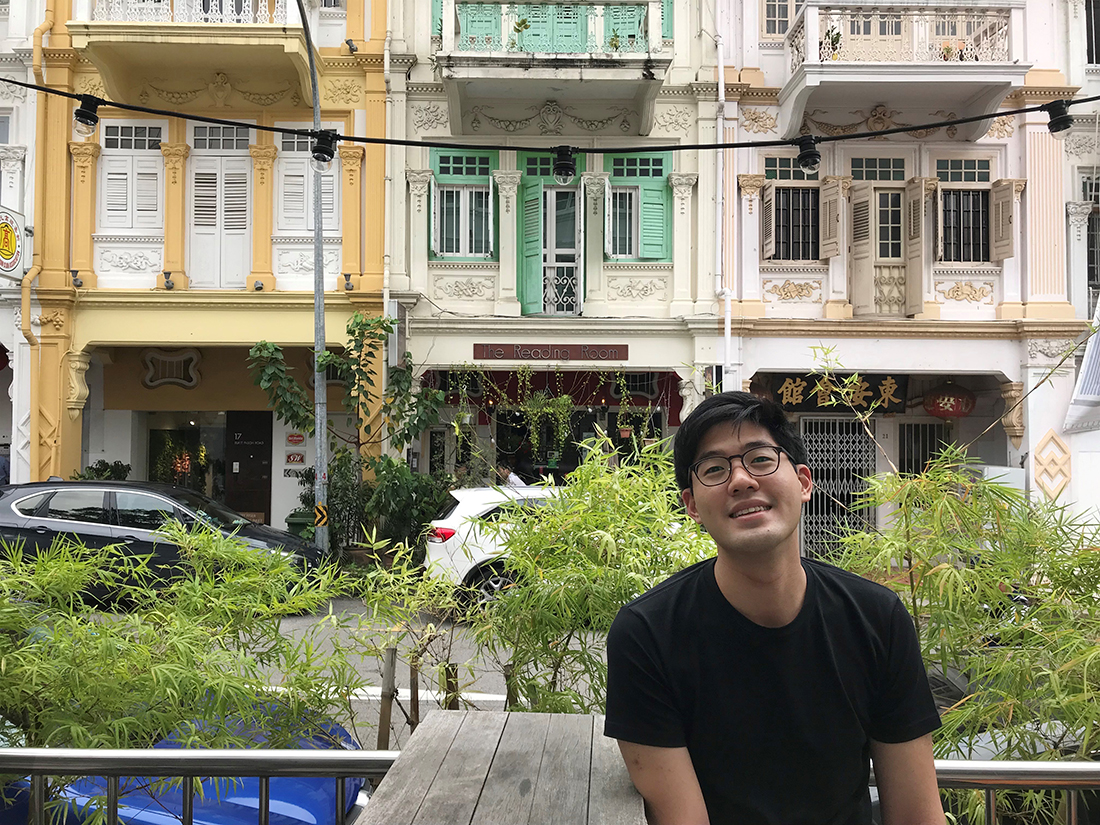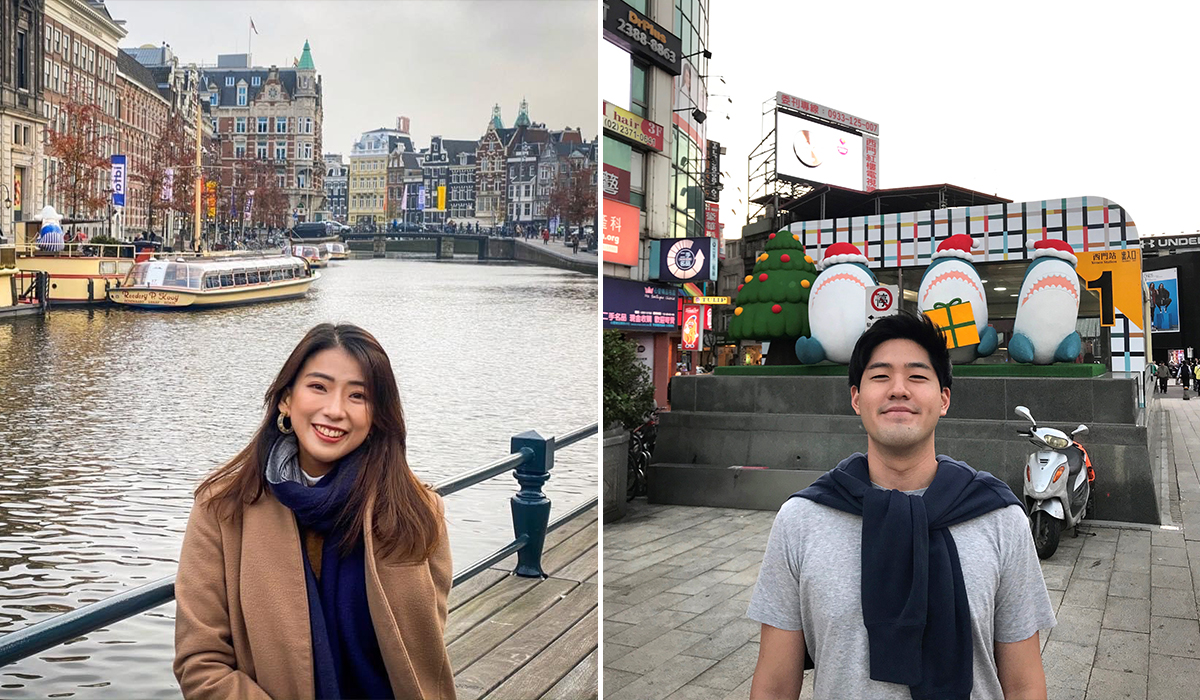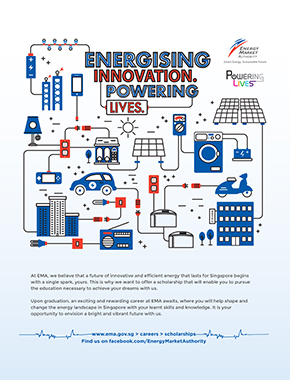Left: Ekko Chua, an EMA Overseas Undergraduate Scholar, has a Master of Engineering Chemical and Energy Engineering from the University of Leeds, UK. She works as an engineer in EMA’s Gas System Department.
Right: Nathaniel Tang’s Bachelor of Science in Economics from the University of Warwick was sponsored by the EMA Overseas Undergraduate Scholarship. He furthered his studies under the scholarship with a Master of Science (Environmental Policy and Regulation) from the London School of Economics and Political Science.
Reliable electricity is one aspect of our daily lives that we sometimes take for granted. More so during the Circuit Breaker period (from 7 April to 1 June) when most of Singapore found themselves telecommuting from home or with children on home-based learning. If anything, the coronavirus crisis reminds us that electricity is more indispensable than ever, powering the devices we use – from laptops to lighting and medical equipment.
We sleep comfortably at night knowing it will be the same tomorrow. This is possible only because the Energy Market Authority (EMA) and its officers work tirelessly behind the scenes.
With EMA’s focus on long-term system planning, the agency takes measures to ensure that our electricity systems are not only resilient but will also power a green future. This helps to safeguard our power supply from the vagaries of market forces and unforeseen challenges such as the coronavirus pandemic.
The agency’s forward approach is shaped by the visions of each generation’s dedicated and enthusiastic individuals. Hence, the EMA Scholarships is an open invitation to graduates where academic dreams and public service converge in a bright and vibrant career.
For those curious to find out what it is like to work in the power sector, we spoke to two of EMA’s Overseas Undergraduate Scholars. Here to share their experiences are Ekko Chua, 26, an Engineer with the Gas System Department, and Nathaniel Tang, 28, a Senior Analyst with the Market Development and Surveillance Department.

Ekko Chua
A Spark of Brightness
The power sector is seldom in the limelight despite being an essential service. It takes motivated individuals to seek this out as a career choice. Ekko is one such individual.
Since childhood, “energy” as a subject has always sparked her fascination. “Powering the future will require new, exciting technologies to tap on the vast array of renewable energy sources out there. One day, wind energy may even become a possibility for Singapore! The options are limitless, from energy efficiency to energy storage batteries. I want to be part of that future in meeting energy challenges head on, no matter what role I play.”
To pursue her interest, Ekko interned twice at EMA; the second time, EMA recognised her potential and invited her back to intern at the Gas Policy Department. Ekko credits those internship days for deepening her understanding of the relationship between electricity and gas, and how they are implemented and regulated in other countries.
Her education did not stop there. Under the EMA Overseas Undergraduate Scholarship, she completed her Master of Engineering degree in Chemical and Energy Engineering from the University of Leeds, UK. The prestigious direct Masters programme helped give her a thorough grounding in the field of engineering and power generation.
The Economics of Energy
In Nathaniel’s case, his interest in the power sector took a more circuitous route while as an Economics student interning at an energy-related company. “I’ve always been interested in the economic mechanisms of industrial markets, such as competition and efficiency. Energy was the one sector that stood out for me because its evolving landscape meant constant changes and new challenges. Even today, we are constantly dealing with new issues such as integration of clean energy, energy efficiency and energy financing.”
To meet those challenges head on, he decided to apply for an EMA sponsorship to further his Economics studies.
Recognising his ability, EMA – offered to sponsor his studies fully. The agency sent him to Summer School at Yale University where he studied Econometrics and Data Analysis & Game Theory, and later to the London School of Economics for his postgraduate studies. Here, he obtained a Master of Science in Environmental Policy and Regulation.

Nathaniel Tang
A Solid Grounding
Nathaniel believes the grounding he received in economic theory with EMA’s help has been crucial. “This has been critical in understanding and utilising real-world data to analyse issues. This helps me to devise practical solutions that seek to make the best use of resources and ensure incentives for efficient long-run investment.
He wants to “pay it forward” by keeping the lights on for Singapore while keeping it affordable. “My role in EMA focuses on electricity market issues. This involves forward planning to ensure that market design can handle the energy transformations taking place, while ensuring reliable electricity at competitive prices to consumers.”
Ekko’s scholarship at Leeds University has also given her a much-needed macro view of the power sector. Her studies emphasised an understanding of the various sources of energy and how to utilise available options given the political, geographical and technical constraints. This is directly relevant to her work. As an engineer in the Gas System Department, she prepares for future gas infrastructure needs – with insights generated from gas demand forecasts – to ensure a sufficient and resilient supply.
She also credits overseas visits and exchanges that EMA sent her on, for opening her eyes to the broader applications of theory in a real-world context. This included a two-week exchange programme between Leeds University, Xiamen University and China University of Petroleum “to understand how China utilises energy”, she shared.
Powering Forward
As both scholars embrace the many opportunities that the power sector has to offer, Ekko and Nathaniel are thankful for the close-knit culture in EMA. “We often collaborate with various departments to push forth certain ideas, initiatives and implementation. It’s great that different departments will reach out to help each other regardless of their area of specialisation. It’s a very good environment for me to learn in,” said Ekko.
For Nathaniel, the chance to work alongside colleagues from a wide range of disciplines brings novel viewpoints. “Being able to learn how to approach problems from various perspectives has helped to broaden my understanding of power concepts and facilitated constructive discussions to achieve win-win solutions.”
Both scholars look forward to welcoming new talent to the fold as EMA is constantly seeking the next generation of torch-bearers for the power sector.
If you, too, wish to help keep Singapore’s lights on in the years to come, EMA is where you can make it happen.


